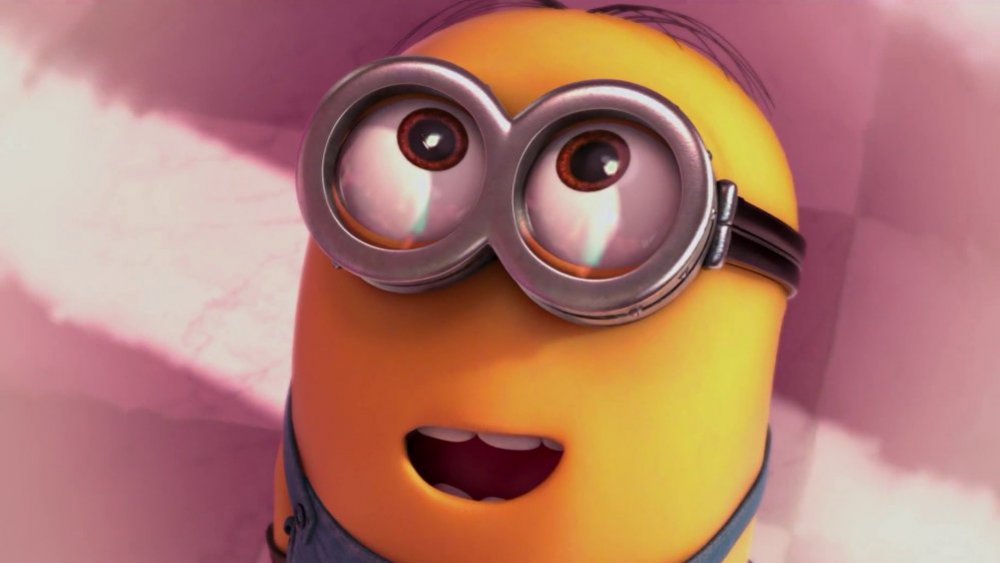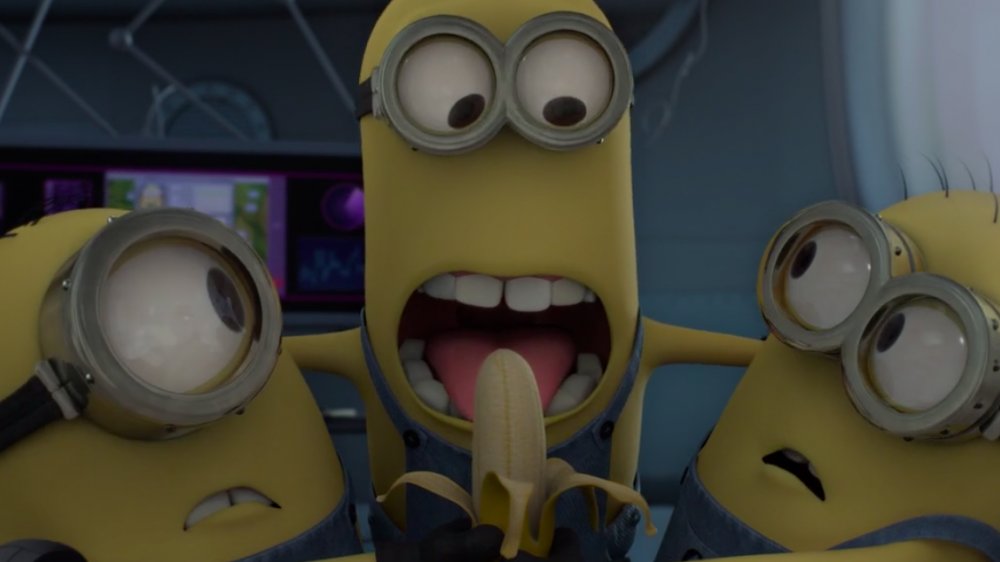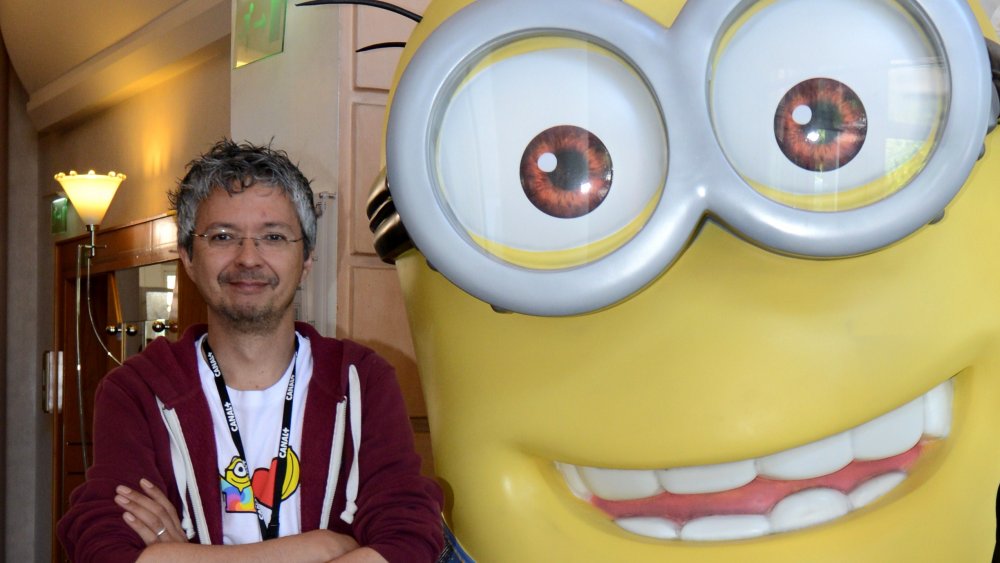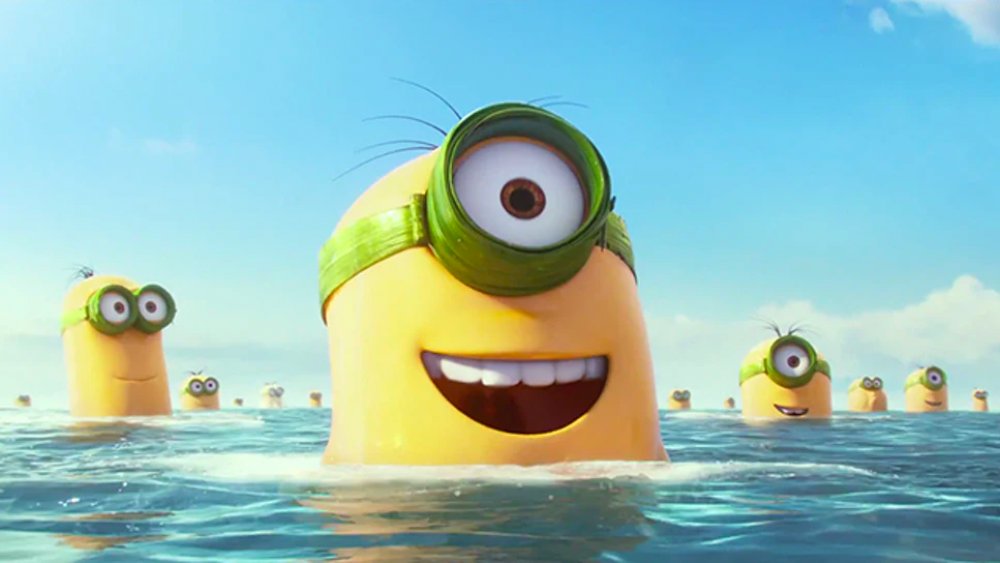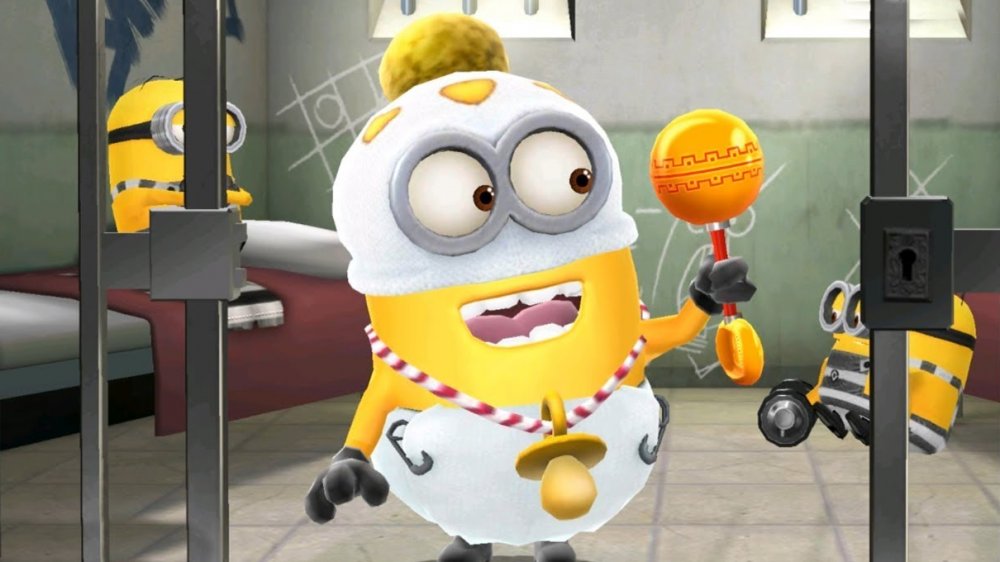The Minions' Language In Despicable Me Explained
This content was paid for by Netflix and created by Looper.
Minions are lovable little mischief-makers that star in the Despicable Me franchise. The small, yellow Mike and Ike-like creatures live to be henchmen, trusted followers of the most villainous villain they can find. That's why they serve anti-hero extraordinaire Felonious Gru, voiced by Steve Carell.
The Minions have so far appeared in four animated feature films, including the Despicable Me trilogy, which launched in 2010, and their own self-titled spin-off, Minions, in 2015. (A second Minions movie, The Rise of Gru, is scheduled for release in 2021.) There are also more than a dozen short films and several video games featuring the cute little pill-like creations.
Minions have a unique look — their standard attire is denim overalls and oversized goggles covering their one or two eyes. But what's even more unique is their language. On the surface it sounds like they're speaking complete gibberish, but if you listen closely, it's really a strangely nuanced vocabulary stringing together multiple languages and sounds.
Here, we explain the Minions' language in the Despicable Me films.
The Minions' language is made up of words from multiple real languages
Minionese, as it's known, is a constructed language created by Despicable Me co-directors Pierre Coffin and Chris Renaud. While it may sound like incoherent babbling, the practically indistinguishable words are actually a handcrafted dialect specifically designed for the Minions. (Other examples of "conlangs" — or "constructed languages" — include the Klingon language from Star Trek, Ewokese from Star Wars, and the Na'vi language from Avatar.)
Minionese, sometimes called Banana Language because of the Minions' love of the yellow-skinned fruit, is a combination of several real languages, including French, Italian, Spanish, Indian, Japanese, and, of course, English, among others. One example of how these words are blended together to create the jumbled language comes from Despicable Me 2, when one of the Minions utters "poulet tikka masala" into an intercom in hopes of unlocking a door. The phrase is a combination of French and Indian that describes the popular Indian-style chicken dish.
While that particular phrase actually means something in other languages, many other phrases o not. (See: "tatata bala tu," which means "I hate you" in Minionese but almost nothing elsewhere.) A lot of what Minions say is just silly sounding words strung together from various different languages with some actual gibberish thrown in. So, no matter where you are in the world, you probably recognize something that comes out of the Minions' mouths.
It's not inconceivable that the Minions would know so many languages, considering their origin movie, Minions, established that they have been traveling the world since the beginning of time in search of the perfect villain to serve. Therefore, why wouldn't they speak multiple dialects?
Translating everything the Minions say is almost impossible to do on the fly, so when the original film was released in 2010 Best Buy created an app that included the Minionator, a Miononese-to-English translator.
The Minions' language prominently features English words
"Me want banana!" It may not be perfect English, but it is English. Yes, in addition to all the foreign languages the Minions use to express themselves, English is also in there — loud and clear. In fact, "banana" is one of the Minions' favorite words.
There's usually a recognizable word or two thrown in every few sentences when Minions talk, which allows English-speaking viewers to feel as though they're following along. "Hey!" "What?" "Idiot." "Wow." And "fight, fight, fight!" are peppered throughout the original Despicable Me and beyond.
But before you think that feeling of "Ah, I understood that!" is just for American audiences, the filmmakers make sure the movies are dubbed around the world so particular words and phrases stand out. That means that people in China or Russia, or wherever the film is screening, also have that "a-ha!" moment.
However, during the 2015 release of Minions, those a-ha's turned into oh no's when some parents thought McDonald's Happy Meal toys based on the little yellow fellas were saying a bad word. While people complained that their toys were saying the equivalent of WTF, McDonald's insisted the words and phrases were all G-rated.
The Minions are mainly voiced by one man
While there may be thousands of Minions, but for the most part, only one man voices them: Pierre Coffin, who also co-directed several of the movies. While Coffin and fellow director Chris Renaud both created the Minions' language and contributed voices to the comical oblong characters (along with Jermaine Clement in the first film), Coffin quickly became the go-to guy. By the time Minions came out, he was the sole voice of the creatures.
Coffin didn't originally intend to take on such a big role outside of directing. But the ball quickly started rolling when, during the early stages of the original film's production, he made a test voice-over to demonstrate how the Minions should sound — and the producers immediately handed the job over to him. The rest, of course, is Minion history.
Coffin speaks multiple languages, so it wasn't a stretch for him to include a variety of dialects in his high-pitched depiction. The filmmaker has noted that the focus is less on the actual words and more on their melodic makeup when put together. "It's about finding a particular magical rhythm...that makes the nonsense make sense," he told The Guardian.
The Minions' language isn't just about words
There's more to Minionese than just words. Like any other language, there's tone, body language, gestures, and expressions, among other things, that help convey a message. So, when a Minion is happy, he may squeal, smile, and excitedly jump up and down. When he's annoyed, he may mumble, cross his arms, and roll his eyes. In that sense, a Minion's feelings are easily communicated.
Also, context is very important in the Minions movies, as it helps make the language easier to understand. An example is when the Minions are being kidnapped in Despicable Me 2 and one of them screams "gelato!" — which is a well-known Italian word for ice cream — as they are whisked off against their will in an ice cream truck. As simple as it may seem, this helps you know what's going on without needing to fully understand what's being said.
Phonetics, the science of pronunciation, also comes into play. Humans are wired to understand a word if it sounds similar to a word they're already familiar with. When bad guy Gru orders some of his Minions to replace a toy unicorn for one of his adopted daughters, the Minions repeat back "papoy," which rhymes with toy and conveys that they understand their mission.
"If I need to evoke something specific," Coffin told The Guardian, "I might search the internet for a particular word from a particular language — for instance, something Dutch for an argument, as it's quite guttural. But without the visuals, the words are meaningless."
The Minions' language is similar to baby talk
The word "minion" originates from the French word mignon (as in filet mignon), which means small and cute. And so not only are the Minions themselves are exactly that, but so is their language. With its high-pitched tone and simple syllables (ba-na-na), it almost sounds like baby talk.
And, like babies, the Minions sometimes add the letters "b" or "p" to words, which are often the first consonants small children learn. They say "bello" instead of "hello," "bapple" instead of "apple," and "poopye" instead of goodbye. Onomatopoeia, the term for a word that actually looks like the sound that it makes, also makes an appearance when the little yellow henchmen say "bee doh bee doh bee doh!" in response to a smoke alarm, childishly replicating the sound of a fire engine.
But the Minions weren't always supposed to be so cute. In fact, during the early stages of the first film, they were supposed to be big, ugly brutes. "We quickly realized that they were very unappealing and made Gru a totally unsympathetic anti-hero," Coffin told The Guardian. "To make him charming, we had this idea that he'd know all of his little helpers by their forenames, even though there were hundreds, and suddenly Gru was sympathetic. And from that first scene we knew the Minions gave the other characters counter-balance, had great comedic potential, and were super cute."
